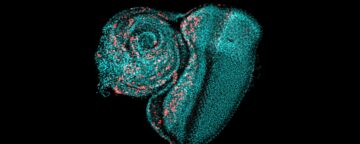Kamal Nahas in The Scientist:
 Cancers typically arise when cells accumulate mutations in their DNA that prevent them from keeping cell division in check.1 However, for some tumor types, researchers have struggled to find mutations, leading scientists to question their causes.2 Now, in a study published in Nature, researchers found that short-lived epigenetic changes can permanently alter gene expression and trigger cancer.3 While most cancers develop following mutations, their findings suggest that a few tumor types might deviate from this rule. For years, Giacomo Cavalli, a geneticist at the French National Centre for Scientific Research, and his colleagues have studied the role that epigenetic factors called Polycomb proteins play in cancer.4 These proteins form complexes that wind up chromatin and switch off genes that promote cell division. The team previously found that mutations in Polycomb factors cause chromatin unraveling, which cascades into cell proliferation and cancer initation.5 They wondered whether they could achieve the same effect by temporarily switching Polycomb genes off.
Cancers typically arise when cells accumulate mutations in their DNA that prevent them from keeping cell division in check.1 However, for some tumor types, researchers have struggled to find mutations, leading scientists to question their causes.2 Now, in a study published in Nature, researchers found that short-lived epigenetic changes can permanently alter gene expression and trigger cancer.3 While most cancers develop following mutations, their findings suggest that a few tumor types might deviate from this rule. For years, Giacomo Cavalli, a geneticist at the French National Centre for Scientific Research, and his colleagues have studied the role that epigenetic factors called Polycomb proteins play in cancer.4 These proteins form complexes that wind up chromatin and switch off genes that promote cell division. The team previously found that mutations in Polycomb factors cause chromatin unraveling, which cascades into cell proliferation and cancer initation.5 They wondered whether they could achieve the same effect by temporarily switching Polycomb genes off.
To test their hypothesis, they turned to the fruit fly, Drosophila melanogaster; the species has only one copy of each gene involved in the Polycomb machinery, making it easier to disrupt the system. Polycomb proteins play key roles during development by influencing the timing of cell differentiation. Cavalli and his team studied the impact of losing this epigenetic control on early, larval structures called imaginal discs. Using a temperature-sensitive RNA interference system, they exposed the discs to warmer temperatures for 24 hours, which temporarily turned off the Polycomb genes for two days. “They very nicely showed that with this transitory system they could switch off this development gene briefly, switch it back on, and that was enough to trigger tumorigenesis,” said Douglas Hanahan, a cancer biologist at the Swiss Federal Institute of Technology Lausanne who was not involved with the work.
More here.
Enjoying the content on 3QD? Help keep us going by donating now.
